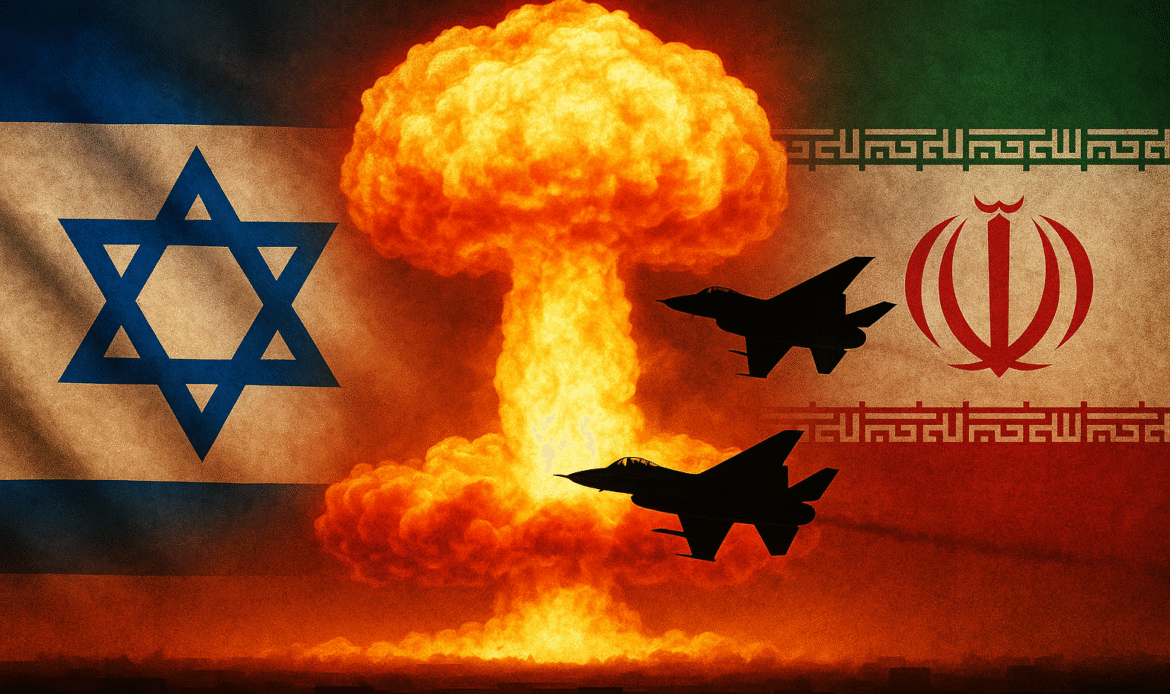By: Steven Sahiounie, journalist and political commentator
A direct military confrontation between Israel and Iran has intensified over the past six days, marking a dangerous shift from years of proxy hostilities. Israel began the war with an unprovoked attack on Iran on Friday, June 13 with airstrikes targeting Iranian military leaders, nuclear scientists and military installations.Iran has retaliated with multiple waves of ballistic missiles and drones.Both sides have hit residential areas as well as military sites, inflicting casualties and injuries in both countries.
The destruction on both sides underscores the severity of the confrontation. U.S. President Donald Trump had initiated negotiations with Iran with the goal of agreeing to a new deal to prevent Iran from having a nuclear weapon. Israel launched the surprise attack on Israel on Friday, while Steve Witkoff, Trump’s special envoy to the Middle East, was scheduled for a Sunday meeting with the Iranian negotiator in Oman.Israeli Prime Minister Benjamin Netanyahu interfered with Trump’s plan to prevent Iran from a nuclear weapon through peaceful diplomatic negotiations.
Netanyahu has warned for 33 years, since 1992, that Iran is just two-weeks away from making a nuclear bomb. Director General of the International Atomic Energy Agency (IAEA), Rafael Mariano Grossi, told CNN on June 17, “We did not have any proof of a systematic effort to move into a nuclear weapon.” Today, Trump will have a top-level meeting in the War Room at the White House to determine if the U.S. will supply Israel with a weapon exclusively owned by the U.S. , the GBU-57, capable of destroying the nuclear facilities at Fodo.
Yesterday, Trump told reporters he had not yet made his decision. Analysts have compared the decision faced by Trump with that of President Harry Truman, before he ordered the bombing of Nagasaki and Hiroshima.
Tomorrow, a negotiating session is planned between the U.S. and Iran, in the hope a diplomatic solution could yet be reached. Experts have warned that Israel, in conjunction with the U.S. might strike Iran during the negotiations. Potential Worst-Case Scenarios
1. U.S. Involvement and Regional Escalation Despite U.S. denials, Iran accuses Washington of backing Israel’s strikes. If Iran retaliates by targeting U.S. forces in Iraq, the Gulf, or diplomatic missions, it could force a direct American military response.
The U.S. has already taken precautionary measures and issued warnings to Tehran. Any American fatalities could pressure the Trump administration to escalate, potentially leading to a broader regional war.
2. Gulf States in the Crossfire Should Iran fail to inflict substantial damage on Israel, it may turn its focus toward Gulf states suspected of aiding Israeli operations. Energy infrastructure and U.S. military bases in the region could become prime targets. In such a scenario, Gulf nations may demand U.S. intervention, further complicating the conflict.
3. Failure to Neutralize Iran’s Nuclear Program Israel’s objective of dismantling Iran’s nuclear capabilities faces significant challenges. Key facilities, such as the heavily fortified Fodo site—buried 800 meters beneath a mountain near Qom—may survive airstrikes without specialized U.S. bunker-busting munitions. If Iran retains its enriched uranium stockpiles, it could accelerate its nuclear program as a deterrent, exacerbating tensions.
4. Global Economic ShockOil prices have already surged following the outbreak of hostilities. A further escalation—such as Iran blockading the Strait of Hormuz or Houthi militants disrupting Red Sea shipping—could trigger a global economic crisis, exacerbating inflation and indirectly benefiting Russia’s war efforts in Ukraine.
5. Collapse of the Iranian government Some Israeli officials view ‘regime change’ in Tehran as a long-term strategic goal. While segments of Iranian society may welcome such an outcome, the sudden collapse of the Islamic Republic could plunge the country into chaos, mirroring the instability seen in post-war Iraq or Libya. Additionally, civilian casualties from Israeli strikes may galvanize domestic support for the current government.
Most analysts point to the fact that there is no organized Iranian political opposition. Experts predict that in the event of a change in the government in Tehran, a very similar government would be formed based on the same political system.
Risk of a Wider Regional WarThe conflict’s expansion remains a critical concern. Iran could leverage its regional proxies—such as Hezbollah in Lebanon and the Houthis in Yemen—to strike U.S. bases and Israeli interests. Missile attacks on American installations in Iraq and Houthi involvement in retaliatory strikes against Israel suggest an emerging escalation mechanism.
Clément Therme, an Iran expert, warns, “We are gradually witnessing the emergence of a mechanism for conflict expansion. The longer the war drags on, the greater the risk of a full-scale regional war.” Europe’s Diminished Role European nations, sidelined during the Gaza war and excluded from U.S.-Iran negotiations, now find themselves with limited influence over the crisis. Despite earlier attempts to revive nuclear talks through secret Geneva meetings, Europe lacks leverage in shaping the Middle East’s future.
Security analyst Claude Moniquet notes that the G7’s response remains uncertain, leaving Washington and Tehran as the primary decision-makers. The Israel-Iran conflict poses severe risks, from regional destabilization to global economic fallout. With neither side showing signs of backing down, the potential for further escalation remains high.
The international community faces a critical test in preventing a wider war while addressing the underlying tensions fueling this dangerous confrontation.
Steven Sahiounie is a two-time award-winning journalist.



